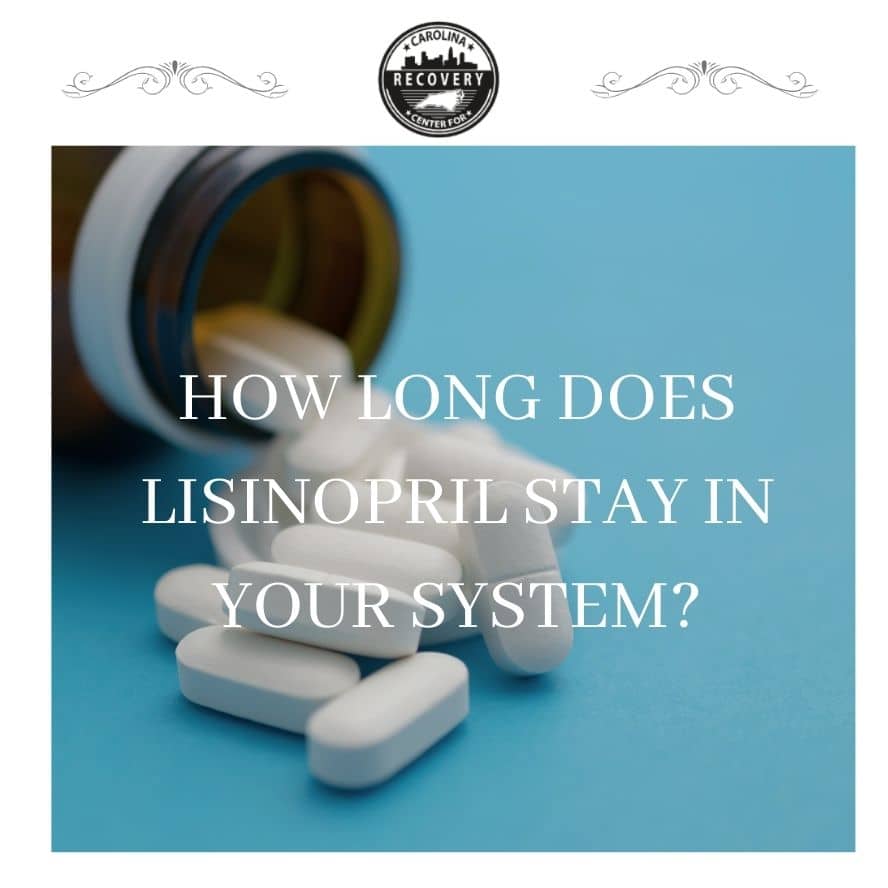How Long Does Lisinopril Stay in Your System?

Medically Verified: 2/1/24
Medical Reviewer
Chief Editor

All of the information on this page has been reviewed and verified by a certified addiction professional.
Lisinopril is a generic medication that is sold under the brand names Prinivil and Zestril. This medication is an angiotensin-converting enzyme (ACE) inhibitor that is prescribed to treat high blood pressure. It is given to people who need to lower their blood pressure to reduce heart damage and the risk of heart disease.[1]
With cardiovascular disease being one of the leading causes of death in America, drugs like lisinopril are widely prescribed. Nearly 100 million prescriptions are written for it each year.[2]
Although lisinopril is not considered a drug of abuse, some people abuse it for its calming effects, and it has a small potential for abuse. Whether you are prescribed lisinopril or abusing it, you may be wondering just how long it will stay in your system.
How Long Do the Effects of Lisinopril Last?
Lisinopril comes in the form of a pill that is swallowed and can reduce blood pressure in a matter of hours. Common side effects include:[3]
- Cough
- Dizziness
- Headache
- Sleepiness
- Diarrhea
People who take lisinopril for high blood pressure must take it twice a day because the effects only last about 12 hours.
What is the Half-Life of Lisinopril?
The length of time it takes a medication to leave your system depends on various factors, including the drug’s half-life. Elimination half-life is a measure used to describe the amount of time it takes for half of a single dose of a substance to leave your body. It takes between four and five half-lives for a drug to leave your system completely.
Lisinopril has a half-life of about 12.6 hours, so you can expect the drug to stay in your system for about 2-3 days.[4]
For How Long Does Lisinopril Show Up on Lab Tests?
A standard 12-panel drug test won’t test for prescription drugs that are not widely abused, including lisinopril. However, doctors can order laboratory testing to see whether or not their patients are taking their medications as directed.
Several types of laboratory tests can be used to screen for lisinopril, including urine, saliva, blood, and hair. While detection times can vary from one person to the next, estimated lisinopril detection times are as follows:
Urine
Your doctor may order a urinalysis to check for levels of medications, including lisinopril, in your system. Lisinopril may be detectable in your urine for up to three days after your last dose.
Blood
If your doctor needs to know your lisinopril levels, they may order a blood test. Like urine tests, blood tests can detect lisinopril for up to three days after your last use.
Saliva
A saliva test, also known as a buccal swab test, will rarely be used, but it can detect lisinopril in your system for up to three days after your last dose.
Hair
Hair tests are rarely ordered by doctors, especially for lisinopril, because this medication is not commonly abused. However, hair tests have a large detection window and can detect various kinds of drugs within 30 days of use.
Factors that Affect How Long Lisinopril Stays in Your System
In addition to the type of test used, many variables influence how long lisinopril stays in your body and shows up in laboratory testing. These include:
- How high of a dose you are taking
- How long you’ve been taking lisinopril
- How frequently you take lisinopril
- How long it has been since you took your last dose
- Your age, weight, and genetics
- Liver and kidney function
- Taking lisinopril with other medications
People with kidney problems will require more time to metabolize and clear lisinopril from their bodies. Also, eating or drinking will not speed up the amount of time it takes to get the medication out of your system.
Detoxing From Lisinopril
The best way to get lisinopril out of your system is to abstain from it completely, however, you should never stop taking the medication without talking to your doctor. Abruptly stopping a cardiac medication that has been prescribed to you can be extremely dangerous to your health. If your doctor has directed you to take lisinopril, it is probably in your best interest.
If you are one of the rare few who abuse lisinopril, you may need to detox under medical assistance to avoid symptoms such as a sudden spike in blood pressure or rapid heart rate. Rebound hypertension can also occur upon discontinuation.
Treatment for Prescription Drug Abuse and Addiction
Despite the fact that lisinopril is not a controlled substance, you can get addicted to any substance you abuse. If you’re worried that you or a loved one are addicted to prescription drugs, medical detox followed by inpatient or outpatient rehab can help you get your life back on track.
If you’re reading this, then there’s a good chance that you or someone you know is suffering from the disease of addiction. We’re here to help you overcome that affliction and we guarantee complete discretion. You don’t need to suffer in silence. Carolina Center for Recovery is a state-licensed and CARF (Commission on Accreditation of Rehabilitation Facilities) accredited substance abuse treatment facility.
We offer individualized, extended-term treatment in an intimate setting located in Charlotte, NC. We take a holistic approach to treating addiction, offering a variety of treatment modalities centered around identifying and resolving the underlying issues associated with the addiction. Each client enrolled in our program will receive individual attention from a therapist and psychiatrist as well as gaining exposure to a multitude of traditional and alternative therapies.
To start your recovery journey or to learn more about our treatment programs, please call now.
References:

